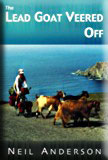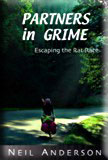
|
Ripped Off!
Morning burst upon our little corner of utopia in a dazzling display of scarlet and crimson. Confident the day would be fine, we packed away our tent under the dawn's lingering ruby glow. Mere minutes later, the sun became shrouded, veiled in a mass of churlish clouds. Those old mariners knew of what they spoke when they had rhymed: "Red in the morn; sailors take warn." We ignored the ominous sky and struck out into a light wind towards Cannai, the next town on our route, where we planned to buy fruit and bread. We had money after all. The narrow coastal route rose and fell like a rollicking ship on ocean swells. At first, the narrowness of the pavement raised my blood pressure, but once I realized traffic was an infrequent occurrence, I relaxed, quite certain I wouldn't be forced to walk the plank. The road's pitch was causing my knobby knees some concern though. Saint Antioco appeared to be a mountain top thrusting out of the Mediterranean depths like the serrated spine of a sea dragon. I worked up a lather for about an hour; my kneecaps feeling as if they were about to bleed. As I grunted up an incline so steep I could have leaned my bike against it, I hunched over my handlebars exerting almost as much upper body strength as lower, when a drop of sweat spattered my shoe and formed into a salty Snoopy dog-shape - complete with beagle-like nose. With sweat stinging my eyes, and my brain on the slippery slope towards delirium, I was able to jar myself back to reality long enough to realize that the town of Cannai had failed to materialize. Cresting the top of one masochistic saw-toothed spine, I took the opportunity for a breather and stopped to check the map. It quickly became obvious that Cannai didn't exist where our map suggested. Before my knees seized completely, I shoved the map back into my handlebar bag and continued towards Calasetta, a larger town on the north end of the island. I hoped it would be there as that was where we planned on buying our entire weekend's supply of provisions. Just when I thought things couldn't get worse, they did. Without warning, the asphalt ended. We slammed on our brakes, and gaped incredulously at the rock-strewn route before us. "The day's shaping up nicely," Sharon said. "Yeah," I sniffed. "We should have listened to those sailors and stayed in bed." We started off down the rough cart track and came to a car parked on the side of the road. A man stood next to it. When we reached him, he asked, "Calasetta?" I nodded. He solemnly pointed down the butt-jarring road. "Three kilometer this," he said slowly, and stomped his boot on the rocky base. "We have three kilometers of this stuff?" Sharon said. "Holy cow!" I said. "It's little more than a cow track." "And not even a very good one at that," Sharon added. We jounced off (that's jolting and bouncing combined), careening over fist-sized rocks, our panniers trying to vibrate off. I began to remember those Portuguese back roads - the ones I had previously maligned as "a connection of potholes" - with fondness. They were beginning to look like smooth freeways in comparison. My sleeping bag, secured to my rear pannier inside a white plastic bag, was slipping off with all the jarring. Before I lost it somewhere en route, I stopped and tightened its bungee cords. "It looks like a marshmallow in bondage," Sharon said, evaluating my finished product. I felt as if I were a slave myself to the ever-worsening road, and tried sitting on my saddle as daintily as possible. The nonstop jarring was already raising havoc with my posterior. We bounced along until we came to a fork in the one-lane road. "Hmmm," I said. "What's that doing here?" "That's the problem with journeys into the unknown," Sharon said. We dug out our map, but it was no help - the road wasn't on it. With no signs to guide us, we were on our own. "I think we should go right, because it has to be the 'right' way. Right?" I said in convoluted non-logic. "Well," Sharon said thoughtfully, "the sea is on our left. If we take the right branch it may lead inland to who knows where. If we keep close to the sea we can't go far wrong." It's hard to argue with logic. We headed off on the left path. Within a quarter of a kilometer, it became a sandy track. Our route was indeed sticking close to the sea. In a kilometer, it dead-ended at the shore. Obviously, we had not chosen the principle strada. We backtracked to the fork and headed off on the remaining branch. In half a kilometer, it too turned to sand, but with the added attraction of being impossibly steep. My rear tire spun on the sand as I tried to power up the overzealous gradients. Sharon got off and pushed her bike. I would have done the same, but my knees hurt too much to walk. "I was incorrect in my cow track assessment," I said as I huffed past Sharon. "It's actually a goat path." The wind intensified, kicking sand in my face; I began to feel like the proverbial 98-pound weakling. We arrived at another unsigned fork and bore left - at least we were consistent. "There's a definite lack of signage," Sharon said, a bit apprehensively. I looked at my watch. "I'm a little worried about how long it's taking us to get to Calasetta," I said. "At this rate, we won't make it before Sunday, let alone before the shops close." Our left fork turned out to be a better choice than our previous left. In two kilometers we were back on pavement. But we still hadn't finished with the unmarked intersections. The locals mustn't have been used to having tourists around - all of them knew where they were going and didn't need signs. After two more route guesses we ended up on a back road that blew us into Calasetta fifteen minutes before noon. "Civilization at last!" Sharon exclaimed as buildings came into view. In Calasetta's main business area, I rushed into grocery stores. Four different shopkeepers informed me bread was "finito." I scavenged whatever scraps they had left in the bottom of their bins. At a fifth store, I chanced upon nine rye buns and bought them all. My shopping expedition was taking a turn for the better. Speaking of shopping, I'm always a bit amused when people curiously ask us what we eat. It's a simple answer really: Everything! We eat everyday fare like everyone else. The only exception, of course, is that we eat a lot more of it! In the store where I found the rye buns, I also discovered frozen pizza garnished with olives, mushrooms and, strangely enough, cabbage, and put four of them into my shopping basket. I looked for Nestle Quik, but finding none, picked up a jar of Oro, a coffee-flavoured kid's drink (they start them young in Italy!). Into my basket, I added eight coffee-flavoured yogurts, a dozen eggs, four tomatoes, a football-sized hunk of cured ham, and a kilo of Edam cheese. On the way to the checkout counter, I found a tin of Nestle Quik lurking on a back shelf and grabbed it too. (With mornings and nights still so chilly we were going through about a kilo a week.) My sixth and final stop was a fruit shop where an old woman loaded me up with a pineapple, a bag of pears, a bunch of bananas, three kilos of oranges, and six onions (what were they doing in a fruit store?). Oh yeah, and two slices of pizza (which I ate on the spot - don't tell Sharon). Grocery shopping was so entertaining. Who expected to find pizza in a fruit shop? Hoping I had bought enough food to keep us content until the stores reopened Monday morning, I staggered back proudly with my sacks of groceries. The shop owners pulled their shutters and locked their doors. Streets that had been bustling with activity only minutes before were suddenly deserted. The only inhabitant still out was a local cyclist with a massive bundle of sticks; they towered over him like some pregnant leaning tower of Pisa. In the gusty wind he was having a miserable time keeping his cargo upright, and almost capsized twice in the block we watched him. We loaded up our panniers and wobbled out of town, struggling with the wind and our added weight as well. We completed our Saint Antioco loop, and headed back over the causeway to the "mainland" of Sardinia. The powerful wind (bridges and causeways always seemed to attract gale-force winds) tossed us across the roadway as if we were a pair of rag dolls. We survived the crossing, and headed north straight into the surging wind. "Considering the prevailing wind," Sharon shouted, "isn't this supposed to be pushing us?" She received no reply. I kept my mouth closed - I didn't want my lips to flap me to death. We struggled onward, woefully, until we spotted an old-timer in a vineyard. He was furrowing a field with a mule and one-blade plow. We needed a break, so we stopped and lay down in a ditch to escape the wind and watched them. Both man and beast staggered a hundred feet, then rested. After a thirty-second time-out, they swung one hundred eighty degrees and plowed a furrow back. It was hard labour. Sufficiently humbled, we pulled up our bootstraps, and carried on. A little farther on I called out, "I think we should call it a day. No use using all our energy battling into this headwind. Tomorrow it'll probably change direction and be pushing us." Sharon didn't take any persuading. She was pretty exhausted. We came to a bridge and Sharon went to investigate how sheltered it was beneath it. She returned laughing. "It's calm under there all right," she reported, "but with all the old tires and appliances scattered about, it has the makings of a garbage dump. Do you want to stay so you'll have a better appreciation for our usual sites?" I declined. Graciously, of course. Passing a field, we spied a faint path running towards the sea. Sheep prints led us to a sheltered spot. We set up our tent and settled in. I peeled an orange and was absentmindedly popping segments into my mouth when I noticed something wasn't quite right. The orange's insides were streaked with red. It hadn't tasted bad, and its peeling appeared normal, but some sections were a sickening vermilion. They looked as if they had been injected with some noxious liquid. I tossed it and peeled another. It too had obscene red streaks in its pulpy fruit. "I've been ripped off! That dang old woman saddled me with a batch of bad oranges! She must have known we were on bikes so we couldn't bring them back," I complained bitterly. "And she had acted so helpful!" I was devastated. The only thing worse than no food was carrying food only to discover it was no good. I immediately placed a hex on the old woman. |

